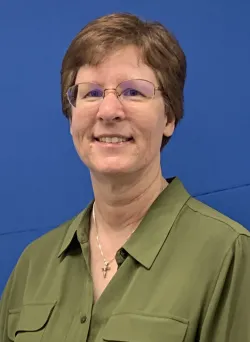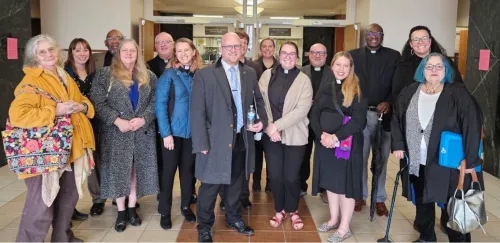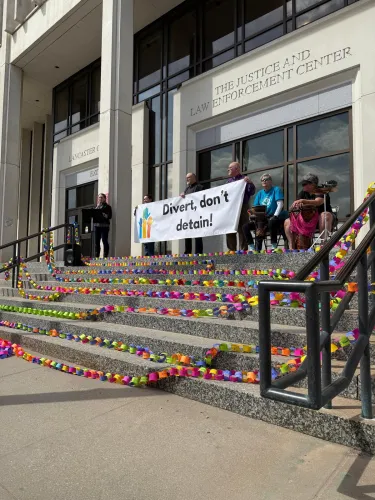Presbyterians embrace congregation-based community organizing in Nebraska
First Presbyterian Church in Lincoln and Justice in Action push for positive change in their community

LOUISVILLE — When you’re not the biggest or most prominent church in town how do you effect change at a systemic level to tackle local issues?
One way is through congregation-based community organizing, which is being practiced in Nebraska by First Presbyterian Church in Lincoln through a grassroots coalition called Justice in Action.

First Presbyterian Church, whose pastor is the Rev. Dr. Sue Coller, has been working with Justice in Action, a grant recipient of the Presbyterian Hunger Program (PHP), for about 3 ½ years to help improve the community.
“Part of our calling as a church is to pray for the welfare of the city in which we live, and for us, prayer isn't just words. It's action as well,” Coller said.
Justice in Action is an interfaith coalition in Lancaster County that has nearly 30 member faith communities working together "to identify and solve big community problems,” said the Rev. Beth Graverholt, lead organizer and executive director of Justice in Action.
The coalition is making inroads on mental health care access and criminal justice reform through what it calls “building the power of organized people.”
The effort got off the ground with a grant from the United Methodist Church and some groundwork by the Direct Action and Research Training Center.
In the early days, “we started with about 30 clergy gathering and talking about the possibilities, and a few months later, we brought our laity along and provided what we call a Rethinking Justice Workshop to really help folks of all faiths see justice as part of their calling as people of faith and ask them, ‘Is this a ministry that you want to have in your local faith community?’ and we had about 80 laity that said, ‘Yes,’ ” Graverholt explained.
Next, participants were trained “to host listening sessions,” she said. “They are trained to gather their friends, family, neighbors, fellow church members and ask the question, ‘What keeps you up at night, worrying?’ … The first year, there were many issues that came up from the about 600 people that participated in the listening sessions.”

Participants vote on which topics the coalition should narrow in on. Graverholt and a colleague help participants to research specific problems and issues in the community and to meet with local stakeholders and nationwide experts to arrive at commonsense, realistic solutions, she said.
Once a year, the coalition has a large gathering called a Nehemiah Action Assembly to address public officials and other decision-makers and to persuade them to publicly commit to addressing community problems, according to the Justice in Action website.
The first Nehemiah Action Assembly “was really energizing for my own congregation, and I know many others,” Coller said. Having local officials on stage and so many people in the room showed “we can make a difference together. That was powerful for us.”
Prior to the formation of Justice in Action, there was really nothing like it in town, Coller said. First Presbyterian Church wanted to be involved because “we live in the community” and “these are issues that touch us in a variety of ways,” she said.
“My particular congregation has a great diversity in economic ability” among the members, she said. “We have some who are very well off, and we have a lot who live very close to the poverty line and below, who live paycheck to paycheck. They are at the food banks, getting food and dealing with housing and mental health issues. Many are dealing with diversion issues with the criminal justice system because about 10% of our congregation is from South Sudan, and they have a much higher incarceration rate in our city than their population warrants, and they don't have the ability — a lot of them — to pay bail and get out.”
One of the things the coalition has been advocating for is a new mental health navigation system, one that Coller is looking forward to seeing get up and running. “It will give me a place to refer people to … because I don't even know a lot of the resources out there. I know some, and the ones I know have a waitlist, so I'm excited to see some of this stuff come about.”
The coalition also has worked on improving access to criminal justice data.
“Our first win was getting the county to launch a dashboard where the public can see, on a daily basis, how many people are in the jail, what the demographics are, what their charges are, how long they've been there,” Graverholt said.

The coalition also is “pushing for adult pretrial diversion programs to expand, and this year, at our action, the county attorney agreed to add a piece of data to that to help us understand why people are being denied diversion,” Graverholt said. “We would like for him to have said, ‘Yes, we'll expand the programs,’ but for right now, at least he's saying he'll be more transparent.”
The coalition is grateful for the support of PHP, which has supported and promoted the work of congregation-based community organizations (CBCOs) around the country for years.
“Justice in Action has been grateful for the work — the support — of the Presbyterian Hunger Program,” Graverholt said. “As we've gotten started, the grants from that organization really have helped us start strong and establish good relationships with our local Presbyterian congregations and our community, so we're grateful for not just the local support but the denominational support as well.”
Congregation-based community organizing continues to play a vital role at a time when many people are concerned about the welfare of vulnerable people in America, according to PHP.
“In a time when democracy is under threat, racial equity is being actively undermined, the affordable housing crisis is deepening and federal budgets threaten to slash Medicaid and SNAP benefits, CBCO is essential,” said Jennifer Evans, an associate for PHP communications and national partnerships. “It equips everyday people — especially those most impacted — to act collectively, confront systemic injustice and reclaim the power rooted in community, faith and hope.”
The next episode of the Presbyterian Advocacy Hour will focus on organizing. It takes place at noon (Eastern) July 23. For more information about the web series or to register, go here.
You may freely reuse and distribute this article in its entirety for non-commercial purposes in any medium. Please include author attribution, photography credits, and a link to the original article. This work is licensed under a Creative Commons Attribution-NonCommercial-NoDeratives 4.0 International License.




